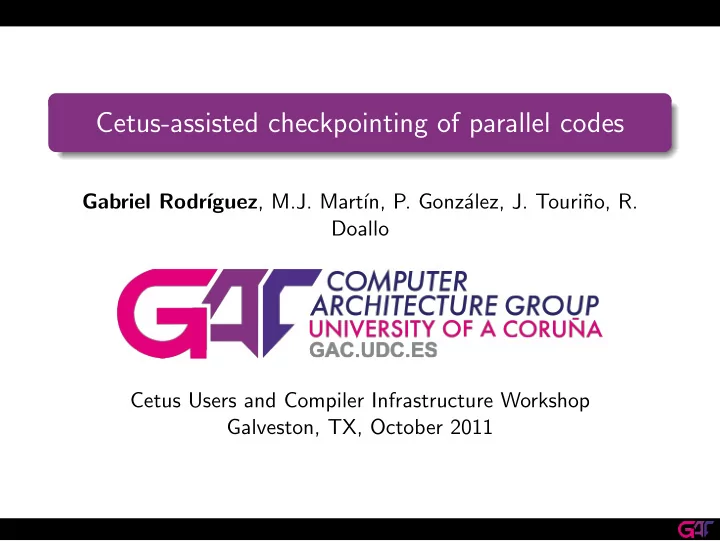

Cetus-assisted checkpointing of parallel codes ıguez , M.J. Mart´ ın, P. Gonz´ alez, J. Touri˜ no, R. Gabriel Rodr´ Doallo Cetus Users and Compiler Infrastructure Workshop Galveston, TX, October 2011
Motivation CPPC ComPiler for Portable Checkpointing Portable checkpointing for SPMD applications. Aims to provide fully transparent operation. Preserves application scalability.
Motivation Why use a compiler? Selection of restart-relevant data Application level System level
Motivation Why use a compiler? Compile-time coordination Uncoordinated processes → restart inconsistencies process start checkpoint
Motivation Why use a compiler? Compile-time coordination Compile-time coordination unsafe unsafe unsafe unsafe unsafe unsafe process start
Motivation Why use a compiler? Compile-time coordination Compile-time coordination unsafe unsafe unsafe unsafe unsafe unsafe process start
Motivation Why Cetus? Well, we used SUIF before... Closed-source front-ends. Buggy front-ends. Unmaintained front-ends. The Cetus License allows modification and redistribution. The Java implementation guarantees portability.
CPPC compiler CPPC design CPPC Compiler Compiler (Cetus) Parallel App. Fault Tolerant (C, C++, Fortran 77, ...) Parallel Application Adapter (C++) CPPC Library (C++)
CPPC compiler Communication analysis Overview Tested for MPI, although the approach is easily extensible by design. Similar to a static simulation of the execution. Uses constant propagation and symbolic expression analysis. Ignores non-communication statements.
CPPC compiler Communication analysis Implementation 1 Detect variables relevant to interprocess communications: Not to the communicated values, but to the communicating processes. semantic input to the compiler int MPI_Send( void * buf, int count, MPI_Datatype datatype, int dest, int tag, MPI_Comm comm )
CPPC compiler Communication analysis Implementation 1 Detect variables relevant to interprocess communications: Not to the communicated values, but to the communicating processes. semantic input to the compiler int MPI_Send( void * buf, int count, MPI_Datatype datatype, int dest, int tag, MPI_Comm comm ) int dest dest = (rank + k) % comm_size; int tag input to the compiler
CPPC compiler Communication analysis Implementation 1 Detect variables relevant to interprocess communications: Not to the communicated values, but to the communicating processes. semantic input to the compiler int MPI_Send( void * buf, int count, MPI_Datatype datatype, int dest, int tag, MPI_Comm comm ) int dest dest = (rank + k) % comm_size; int tag input to the compiler int dest int rank int tag int comm_size int k ...
CPPC compiler Communication analysis Implementation 1 Detect variables relevant to interprocess communications: Not to the communicated values, but to the communicating processes. 2 Assign known constant values to detected communication-relevant variables. 3 Analyze the code in execution order. Determine whether an instruction is a safe point. 1 If it is a communication statement: analyze. 2 If it is a communication-relevant statement: symbolic analysis. 3 Else, skip to next statement. 4
CPPC compiler Checkpoint insertion Overview Locate points in the code where checkpoints are needed in order to guarantee progress. Discard any code not inside loops. Computation time cannot be accurately predicted: use heuristics.
CPPC compiler Checkpoint insertion Cost estimation Procedure f() (body) CompoundStatement (call) ExpressionStatement (loop) Loop statement (if) IfStatement
CPPC compiler Checkpoint insertion Cost estimation Procedure f() (body) CompoundStatement (call) ExpressionStatement FunctionCall (loop) Loop statement (if) IfStatement
CPPC compiler Checkpoint insertion Cost estimation (call) ExpressionStatement (loop) Loop statement (body) CompoundStatement (leaf) ExpressionStatement (leaf) ExpressionStatement
CPPC compiler Checkpoint insertion Cost estimation Procedure f() (body) CompoundStatement (call) ExpressionStatement (loop) Loop statement (if) IfStatement (then) CompoundStatement (else) CompoundStatement
CPPC compiler Checkpoint insertion Cost estimation Procedure f() (body) CompoundStatement (call) ExpressionStatement (loop) Loop statement (if) IfStatement
CPPC compiler Checkpoint insertion Loop thresholding L H l t d(l ) t h(l)
CPPC compiler Live variable analysis Overview Analyze sections of code for live variables that need to be stored into checkpoints. The traditional analysis proceeds from the end of the code up to the start, traversing basic blocks. CPPC does not use the CFG infrastructure in Cetus, but implements an execution order version: Interprocedural version. Some array optimizations. Each non compound statement has been annotated with its consumed and generated symbols. This information is forward-propagated taking into account the control flow.
CPPC compiler Live variable analysis Traversing the code
CPPC compiler Live variable analysis Traversing the code
CPPC compiler Putting it all together "main" FUNCTION conditional jump application code jump target var. registers checkpoint code analyzed for live vars.
CPPC compiler Putting it all together "main" FUNCTION "f_1" FUNCTION "f_n" FUNCTION conditional jump conditional jump conditional jump application application application code code code jump target jump target jump target "main" registers "f_1" registers "f_n" registers call to f_1 call to f_2 checkpoint code analyzed code analyzed code analyzed for live vars. for live vars. for live vars. main main main f_1 f_1 STACK ... f_n
CPPC compiler Extending Cetus: Fortran support Fortran 77 front-end that generates Cetus IR from F77 codes. Reuse Cetus IR as much as possible. Extend Cetus IR where necessary, preserving interface and behavior. Back-end to transform Cetus IR back into F77 code.
CPPC compiler Extending Cetus: Fortran support IR extensions cetus.hir.Declaration : COMMON , DATA , DIMENSION , EXTERNAL , INTRINSIC , PARAMETER , SAVE . cetus.hir.Literal : DOUBLE literals. cetus.hir.Specifier : COMPLEX , DOUBLE COMPLEX , ARRAY( lbound, ubound ) , CHARACTER*N . cetus.hir.Statement : Computed GOTO s, FORMAT , Fortran-style DO , Implied DO . cetus.hir.Expression : expressions in FORMAT , substrings, IO calls. cetus.hir.UnaryOperator : && . cetus.hir.BinaryOperator : ** , // .
Concluding remarks Perceptions on the Cetus infrastructure Perceived strengths Java implementation: portability and clean design. Completely open architecture from head to toe. High level representation. Evolving infrastructure (e.g. new built-in analyses). Perceived weaknesses Complex IR. Performance.
Questions? Cetus-assisted checkpointing of parallel codes Gabriel Rodr´ ıguez , M.J. Mart´ ın, P. Gonz´ alez, J. Touri˜ no, R. Doallo http://cppc.des.udc.es -- grodriguez@udc.es
Recommend
More recommend